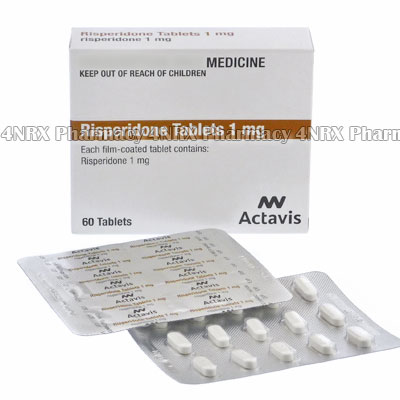 |
Home  Antidepressants Antidepressants  Risperidone (Risperidone) Risperidone (Risperidone) |
|
|||||||||
|
|
Risperidone (Risperidone)
What is Risperidone (Risperidone) used for? Risperidone is an antipsychotic medication used to treat patients with schizophrenia. It operates by balancing levels of neurotransmitters in the brain to reduce symptoms associated with this condition including disorganized thinking, hallucinations, and agitation. This action also makes it useful for treating manic episodes of bipolar disorder or to reduce aggression in patients with dementia caused by Alzheimer`s disease. Your physician may prescribe it to treat other unlisted conditions, as well. How should I use Risperidone (Risperidone)? Follow your physician`s instructions while using Risperidone to get the most effective results from treatment. It may be administered once or twice each day at a dosage of one tablet, but your particular instructions will differ depending on the severity of your symptoms. Swallow these doses whole with a full glass of water. Never change the form of the tablets by crushing, splitting, or chewing them as this may destroy or alter the effects of their contents. Ask your pharmacist or physician if you have any questions about the medication to ensure the correct usage. What are the side effects of Risperidone (Risperidone)? Risperidone may cause side effects in some patients such as:
Tell your physician if any of these conditions become severe or worry you. Also disclose if more serious side effects appear such as tremors, seizures, faintness, trouble swallowing, sore patches in the mouth, nosebleeds, or a painful erection lasting more than four hours. These conditions may need immediate medical attention or changes to your regimen to prevent further problems from occurring. Please Note Do not begin using Risperidone if you have dementia that is not caused by Alzheimer`s disease. Also inform your physician if you have hypertension, hypotension, history of blood clots, diabetes, epilepsy, Parkinson`s disease, heart conditions, dehydration, slowed heart rate, or tumors that may be dependent on prolactin. These conditions may require reduced dosages to prevent potential health problems from occurring. Strictly follow all instructions provided to you by your physician or pharmacist while using Risperidone. Optimum and safe dosage can differ based on the patient and the condition being treated. As this medication may be unsafe for certain patients, it is essential you always inform your physician if you are pregnant or breastfeeding, as well as if you have any allergies, other illnesses, or ongoing health conditions, and if you are taking any other form of medication, supplements, or herbal products. Immediately seek emergency medical care if you have an allergic or hypersensitive reaction. Common signs of a reaction include hives, swelling, skin rashes, chest pains, as well as trouble breathing or swallowing. 
|
||||||||||||||||||